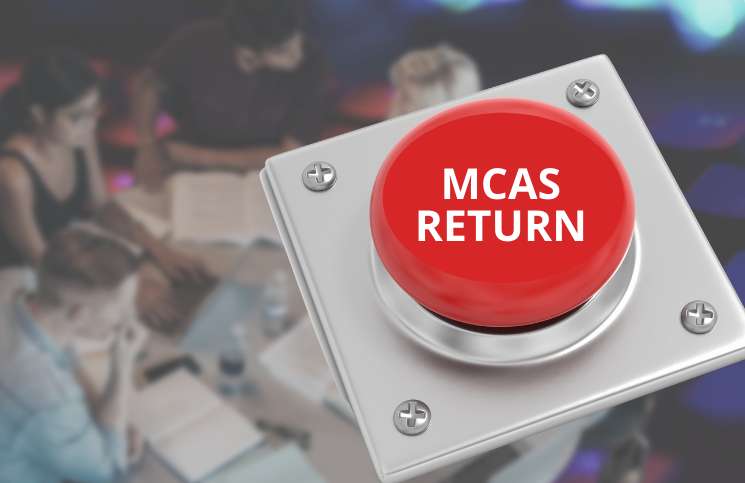by Gary Kaplan
Board of Education reinstates accountability system
MCAS is back.
And JFY can help.
JFY has helped students succeed on MCAS since the test was first given in 1998. Our signature early success was in 2000-2001, when we helped the lowest-scoring school in Boston raise its passing rate 30 percentage points. Our secret is simple: read on and find out what it is.
But first, a look back. The pandemic disrupted the MCAS schedule, as it disrupted everything. There was no MCAS in the shut-down year of 2020. In the remote year of 2021 it was optional and less than fully subscribed. When the current school year began, with its return to the classroom, it was not clear whether the previous testing regimen, in place since 1998, would be restored, or revised, or abandoned.
On February 15, the cloud of uncertainty was lifted. The Board of Elementary and Secondary Education voted to reinstate MCAS substantially as before, with the same Competency Determination standards for students but a temporarily relaxed accountability standard for schools.*
The Board’s discretion in the matter was limited. A statewide assessment is required by state law and federal law. The choice was to use MCAS or switch to another assessment. There was no legal option to dispense with assessment altogether. The Board chose to stay with the assessment system that was developed by Massachusetts teachers in the 1990s based on the state curriculum standards, and updated in the 2010s. It is a system with which all Massachusetts schools are familiar.
The most important feature of the MCAS system for students is the Competency Determination. This is the score a student must attain on the 10th grade English Language Arts and Math tests in order to graduate. Scores are calculated through a system devised years ago that counts up the correct answers on the 30 ELA questions and 42 math questions and runs those “raw” numbers through an algorithm that produces a “scaled score.” The required scaled score—the Competency Determination—is 240. A score of 220 can also secure a diploma with subsequent work on an Educational Proficiency Plan. In the last five years of the old “Legacy” MCAS, over 90% of 10th graders regularly achieved 240 in ELA and 78-79% in Math on the first try. Those who fell short had multiple chances to prep and retest in 11th and 12th grades. Very few did not succeed in rising to the Competency Determination.
Now for our MCAS secret: we teach the state standards. Our online JFYNet instructional program is tightly aligned to grade-level standards in ELA and math. We intend it to be used as a supplement to the teacher’s syllabus, not a substitute. Teachers can use JFYNet to reinforce classroom instruction or to provide scaffolded intervention to address learning gaps. The curriculum is shaped and supervised by the teacher and scheduled on a regular basis during school hours. Since it is individualized and self-paced, it can be pursued independently at any time by the student to maximize progress. We have specialized features for ELL students, including reading text presentation in Spanish and other languages. Our math curriculum can also be translated using Google Translate.
The scope of JFYNet is much broader than the standards typically included in the 30 ELA test questions or the 42 math questions. Our scope is the full range of each grade level. However, since MCAS questions are derived directly from the state standards, we can condense a unit to the subset of standards most frequently found on MCAS. Right now, we are focusing on 10th grade math for high schools in advance of the May test administration. Refreshing students on targeted standards that they may have forgotten or never mastered can make a distinct difference in their scores. And since MCAS scores are the sole academic measurement of school performance, a few more correct answers can make a difference in a school’s accountability ranking.
JFY has been helping students, and their schools, meet the MCAS challenge for two decades. We have the resources and the expertise to meet the revived challenge this year and in future years. All it takes is an email to info@jfynet.org to get the process started.
For a more detail, view the PowerPoint below.
(Click on the arrows underneath the presentation display to move slides forward and backward.)
Gary Kaplan is the executive director JFYNetWorks.
Other posts authored by Gary can be found here.
* Click here for the approved 2/15/22 Dese meeting minutes.
HOW ARE WE DOING? In our pursuit to serve up content that matters to you, we ask that you take a couple of minutes to let us know how we’re doing? Please click here to be navigated to our JFYNet Satisfaction Survey. Thank you!





